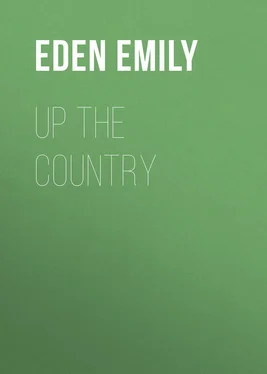Emily Eden - Up the Country
Здесь есть возможность читать онлайн «Emily Eden - Up the Country» — ознакомительный отрывок электронной книги совершенно бесплатно, а после прочтения отрывка купить полную версию. В некоторых случаях можно слушать аудио, скачать через торрент в формате fb2 и присутствует краткое содержание. Жанр: foreign_antique, foreign_prose, на английском языке. Описание произведения, (предисловие) а так же отзывы посетителей доступны на портале библиотеки ЛибКат.
- Название:Up the Country
- Автор:
- Жанр:
- Год:неизвестен
- ISBN:нет данных
- Рейтинг книги:3 / 5. Голосов: 1
-
Избранное:Добавить в избранное
- Отзывы:
-
Ваша оценка:
- 60
- 1
- 2
- 3
- 4
- 5
Up the Country: краткое содержание, описание и аннотация
Предлагаем к чтению аннотацию, описание, краткое содержание или предисловие (зависит от того, что написал сам автор книги «Up the Country»). Если вы не нашли необходимую информацию о книге — напишите в комментариях, мы постараемся отыскать её.
Up the Country — читать онлайн ознакомительный отрывок
Ниже представлен текст книги, разбитый по страницам. Система сохранения места последней прочитанной страницы, позволяет с удобством читать онлайн бесплатно книгу «Up the Country», без необходимости каждый раз заново искать на чём Вы остановились. Поставьте закладку, и сможете в любой момент перейти на страницу, на которой закончили чтение.
Интервал:
Закладка:
Emily Eden
Up the Country
My dear William,
I know no one but yourself who can now take any lively interest in these Letters.
She to whom they were addressed, they of whom they were written, have all passed away, and you and I are now almost the only survivors of the large party that in 1838 left Government House for the Upper Provinces.
Many passages of this Diary, written solely for the amusement of my own family, have of course been omitted; but not a word has been added to descriptions which have little merit, but that they are true and that they were written on the spot.
Now that India has fallen under the curse of railroads, and that life and property will soon become as insecure there as they are here, the splendour of a Governor-General’s progress is at an end.
The Kootûb will probably become a Railway Station; the Taj will, of course, under the sway of an Agra Company (Limited, except for destruction), be bought up for a monster hotel; and the Governor-General will dwindle down into a first-class passenger with a carpet-bag. These details, therefore, of a journey that was picturesque in its motley processions, in its splendid crowds, and in its ‘barbaric gold and pearl,’ may be thought amusing. So many changes have since taken place in Indian modes of travelling, that these contrasts of public grandeur and private discomfort will probably be seen no more, on a scale of such magnitude.
Believe me, Ever your affectionate Aunt, EMILY EDEN.Eden Lodge, Kensington Gore:
May , 1866.
CHAPTER I
‘ONCE more upon the waters, yet once more,’ and so on. We are now fairly off for eighteen months of travelling by steamers, tents, and mountains – and every day of a cabin seems to me like so much waste. They ought all to go to the great account of the long voyage that will, at last, take us home again. And this cabin looks so like my ‘Jupiter’ abode, in all its fittings and appointments, that it is really a pity so to throw its discomforts away in going farther off. Well, I am sure it is all for the best – I make no objection – I like to see things take their course; but still I do say, that for a person who required nothing but to be allowed the undisturbed enjoyment of that small Greenwich house and garden, with all its little Cockney pleasures and pursuits, I have been very hardly treated and rather overworked. We got up at five this morning; the servants were all in a fuss, and Wright was in all the delusions of carpet-bags and nice bandboxes, in which she may be indulged till we leave the steamer, and then she will be obliged to wake from them, as the coolie is yet to be discovered who would carry a carpet-bag, and a bandbox does not precisely meet the views of a camel.
When we came down for some coffee, the great hall was full of gentlemen who had come to accompany his lordship to the ghaut – even Mr. Macaulay had turned out for it. F. and I, with Captain P., soon took ourselves off, and drove down to the landing-place. There were two lines of troops from the door of Government House to the river, and the band was playing that march in the ‘Puritani’ which, when we were at the Admiralty, used to be played every morning by the Guards’ band, and which, consequently, always carries me back to the horrid time of our preparations for leaving England, so I can always cry it all over again to that tune. The road was covered with carriages and riders; and, at the ghaut, a large set of our particular acquaintances were waiting for us, so we got out and stood with them while G. made his progress on foot. It was really a very pretty procession: such crowds of people and such diversities of dress. He is not so shy as he used to be at these ceremonies, though I think a long walk through troops presenting arms is trying to everybody. The instant he arrived at the ghaut, he gave a general goodbye, offered me his arm, and we walked off to the boats as fast as we could. The guns fired, the gentlemen waved their hats, and so we left Calcutta. It has really done handsomely by us, and we ought to be obliged to them for saying – if it is no more – that they are sorry we are going. But I daresay we are an amusement to them. They liked our balls and parties, and whatever we did or said was the subject of an anecdote; and if we said or did nothing they invented something for us – and it all served to wonder at – which, in a country where there is little society and few topics, was an advantage.
The Sunderbunds, Monday, Oct. 23.We came into these lovely riant scenes on Sunday morning. They are a composition of low stunted trees, marsh, tigers and snakes, with a stream that sometimes looks like a very wide lake and then becomes so narrow that the jungle wood scrapes against the sides of the flat – and this morning scraped away all G.’s jalousies, which are a great loss. I never saw such a desolate scene: no birds flying about – there is no grain for them to eat. We have met only one native boat, which must have been there since the Deluge. Occasionally there is a bamboo stuck up with a bush tied to it, which is to recall the cheerful fact that there a tiger has carried off a man. None of our Hindus, though they are starving, will go on shore to cook – and, indeed, it would be very unsafe. It looks as if this bit of world had been left unfinished when land and sea were originally parted. The flat is dreadfully hot at night; but not more uncomfortable than a boat must necessarily be in this climate.
I must make you acquainted with the other flat, because then, once for all, you will understand our prospect of travelling companions. You know all about Mr. and Mrs. A. and their two children. Mr. and Mrs. B. are our next couple. He is one of the Government secretaries, clever and pleasant, speaks Persian rather more fluently than English; Arabic better than Persian; but, for familiar conversation, rather prefers Sanscrit. Mr. and Mrs. C. (belonging to Mr. B.’s office) are a very pleasant couple; he acts and sings, and knows most of the people we know, and she sings and plays on the harp like an angel; and they have a small child, the least little sick thing possible, which I affection, and I mean to borrow it when we are in camp to play in my tent. I often weary for a child to talk to. Captain and Mrs. D. are our commissariat couple – she is very pretty. General E. is the public military secretary – an astutious oldish man. The two steamers generally anchor together at night; but the other comes in later than ours, and so we have seen none of the other party but Mr. A., who says they do very well together, all things considered. General E. is suspected of not being partial to the small D., A., and C. children – there had been rather an angry controversy about some apple and pear jam; and, in general, they were all, like our noble selves, so much bored that they went to bed at eight. Otherwise, they were all perfectly happy.
Wednesday, Oct. 25.We stopped at Koolna yesterday for coals, and stayed an hour to let the Hindus cook their dinner. We are out of the Sunderbunds now, and steaming between two banks not quite so elevated, nor nearly so picturesque as those flat marshes between Eastcombe and the river; and, they say, we shall see nothing prettier, or rather less hideous, between this and Simla, except at Raj Mahl. G. is already bored to death with having nothing to do. He has read two novels and cannot swallow any more, and is longing for his quiet cool room at Government House. The nights are dreadful – all for want of a punkah – and hardly any of us get a wink of sleep. However, we shall soon overtake cooler weather. The six gentlemen passed the three first nights on deck, owing to the heat below, and I sat up in bed fanning myself. The native servants sleep any and everywhere, over our heads, under our feet, or at our doors; and as there are no partitions but green blinds at the sides and gratings above, of course we hear them coughing all night.
Читать дальшеИнтервал:
Закладка:
Похожие книги на «Up the Country»
Представляем Вашему вниманию похожие книги на «Up the Country» списком для выбора. Мы отобрали схожую по названию и смыслу литературу в надежде предоставить читателям больше вариантов отыскать новые, интересные, ещё непрочитанные произведения.
Обсуждение, отзывы о книге «Up the Country» и просто собственные мнения читателей. Оставьте ваши комментарии, напишите, что Вы думаете о произведении, его смысле или главных героях. Укажите что конкретно понравилось, а что нет, и почему Вы так считаете.












